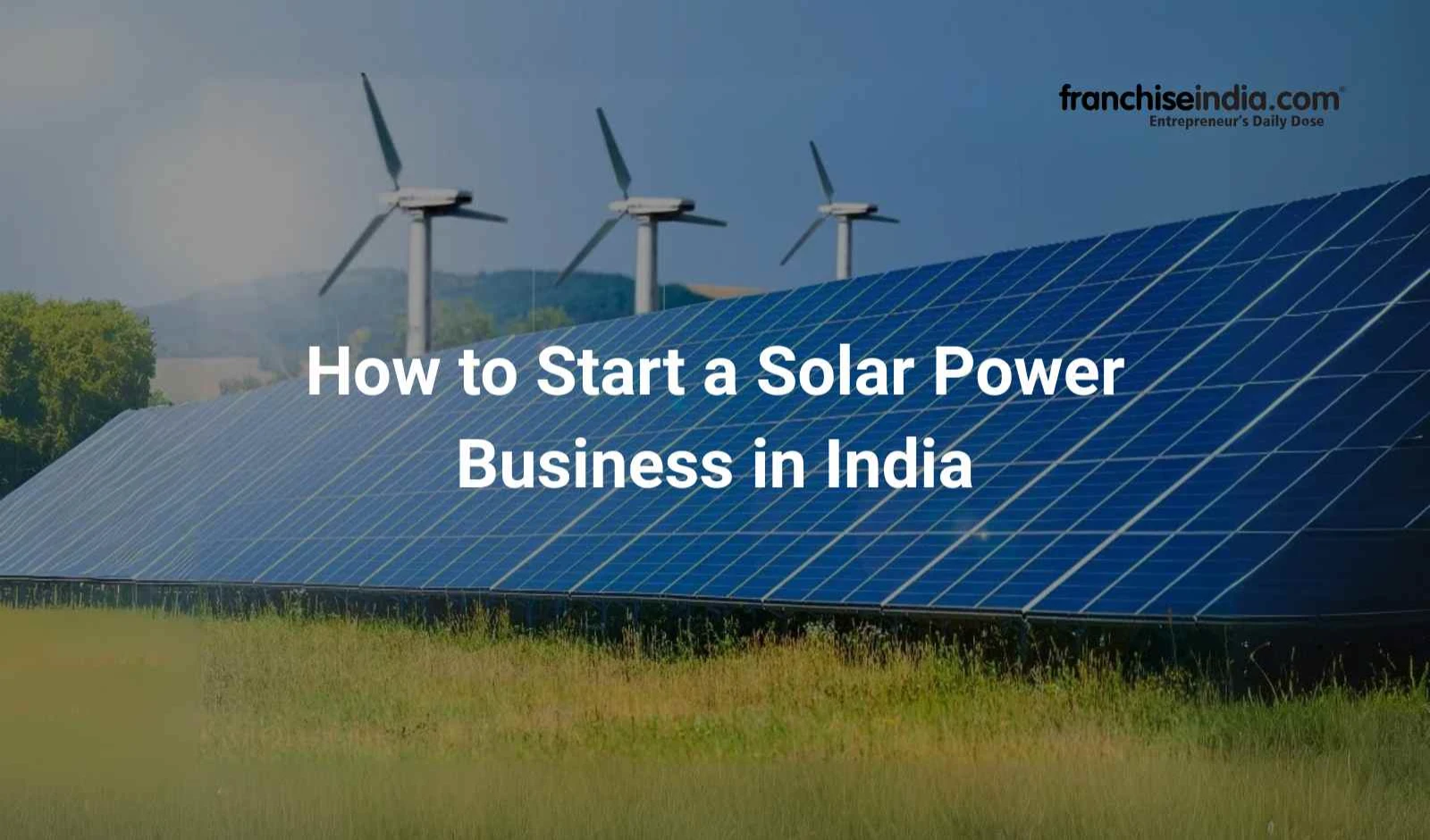
India’s solar energy scene is buzzing right now. You can feel it everywhere—from city rooftops to remote villages, the shift to solar is speeding up. People are fed up with high electricity bills, cities keep expanding, and there’s this real push from the government to go green. All that’s driving more and more homes, businesses, and factories to look at solar power, not just as a backup, but as the main thing. For anyone thinking about starting a business or investing in something solid, solar isn’t just another trend. It’s one of those rare things that actually feels both smart and future-proof.
If you’re wondering how to get started, this guide lays it all out. You’ll find everything you need: the big business models, the paperwork and certifications you’ll need, how much money to set aside, what to charge, how to pick your suppliers, who to hire, and how to get your first customers. Whether you want to open a small solar shop, run an installation company, or build something massive, this article walks you through every step so you can actually get moving in India’s booming solar market.
Also read: 11 Small Business Ideas in Punjab
Why Solar Power Business Is a Big Opportunity in India
India aims for 500 GW of renewable energy capacity by 2030, of which solar contributes the majority.
Electricity tariffs are increasing across most states.
Homes, housing societies, schools, petrol pumps, hospitals, hotels, shops, and factories are shifting to solar.
Businesses want to reduce operating cost (OPEX) and carbon footprint.
Subsidies (especially for residential rooftops) are driving adoption.
Solar demand is not seasonal—customers spend to cut electricity bills 12 months a year.
Step 1—Choose Your Solar Business Model
.jpg)
You can start with one or multiple of the below models depending on budget.
1. Solar Product Retail & Distribution
Solar product retail and distribution involves selling panels, batteries, inverters, street lights, and water pumps. Panels usually cost anywhere from ₹22 to ₹32 per watt, while water pumps go from ₹75,000 up to ₹4,50,000. With an investment of ₹3–₹10 lakh (for inventory, a basic shop, and a bit of branding), you can expect margins of 8–18% on panels and 10–30% on accessories.
2. Solar EPC/Installation Business (Most Profitable)
A solar EPC business handles design, supply, installation, and maintenance of solar systems for homes, shops, institutions, and industries. Project values start at ₹80,000 for small setups and can go all the way up to ₹5 crore for giant factories. You’ll need to invest ₹4–₹15 lakh to get started, but margins are solid—15–28% per project, plus extra income (6–12%) from annual maintenance contracts.
3. Solar Component Manufacturing
Manufacturing solar parts—like panels, cables, batteries, and frames—is a different game. You need deep pockets (₹50 lakh to ₹20 crore), so it’s better suited for big players or people teaming up for large-scale production.
4. Solar Water Pump Business
Focus on farmers by providing solar water pump solutions supported by government subsidy schemes. Each pump costs between ₹75,000 and ₹4,50,000, and dealers often pull in 15–25% on each sale. It’s high-demand, and the margins are hard to beat.
5. Solar Consultancy / Solar Audit
This model focuses on consultancy rather than installation—you guide customers in choosing the right solar system, design solutions, and recommend vendors. With an investment of ₹50,000–₹3 lakh for training, a laptop, and tools, you can earn ₹1,000–₹25,000 per audit along with commissions from EPC partners.
To start a solar power business in India, completing the required legal registrations ensures legitimacy, eligibility for government programs, and customer trust. Register your business (GST Proprietorship, LLP, or Pvt. Ltd.)—that usually costs between ₹2,000 and ₹25,000. GST and MSME/Udyam registration are free and open doors to tax breaks and government incentives. Protect your brand with a trademark registration (₹4,500–₹9,000). If you’re doing installations, you’ll also need a state-level electrical contractor license (₹15,000–₹1,00,000). Got staff? Make sure you’re following labor laws and have insurance (₹2,000–₹20,000 per year).
If you’re running an EPC company, think about getting empaneled with your state DISCOM. It’s a credibility boost, especially for net-metering projects. For retail solar shops, you don’t need food or safety certificates—just a basic municipal trade license.
Also read: How to Start a Pizza Business?
Step 2—Equipment & Tools Required (with Cost)
.jpg)
To run a solar EPC (Engineering, Procurement & Construction) business smoothly, having the right equipment and installation tools is essential. A solid EPC setup usually means 2–3 drilling machines (₹15,000–₹45,000), safety harnesses and PPE kits for each installer (₹6,000–₹20,000), and standard electrical tools like crimpers and cutters (₹8,000–₹25,000). You’ll also need multimeters and circuit testers (₹1,000–₹8,000) and, for rooftop jobs, ladders and scaffolding (₹10,000–₹45,000). Don’t forget transport—a pickup van costs ₹3–₹12 lakh, or you can just rent one per project (₹1,500–₹4,500 per day) to keep early costs down.
All in, plan on spending ₹1.2–₹3 lakh on tools to get your EPC startup off the ground, depending on the quality you want and the size of your team.
Step 3—Workforce & Salaries (Monthly INR)
.jpg)
Running a solar power business takes a solid, reliable team. You need people who know what they're doing—plain and simple. At the center, you have your solar engineer or site supervisor. They’re the ones handling system design, site surveys, and making sure installation plans make sense. An electrician deals with all the wiring, inverter hookups, and safety checks. Technicians and helpers? They’re the backbone, taking care of drilling, mounting, and all that rooftop work.
To actually get projects in the door, you need a salesperson who finds leads and visits customers. Someone in the office should keep the paperwork moving, handle invoices, and sort out logistics.
In the beginning, most founders cut costs by wearing multiple hats. They’ll run sales and operations themselves and just bring on a small field crew—usually an electrician and a helper. That way, you only spend more as you start earning more. As business picks up, you can add more techs, bring in a dedicated salesperson, and hire a site supervisor. That makes it easier to handle bigger jobs or juggle multiple projects at once.
Step 4—Total Investment Required
.jpg)
Starting a solar business doesn’t have a one-size-fits-all price tag. It really depends on what kind of company you want to run. If you’re starting a consultancy, you only need to cover training, some tools, and a bit of branding—so the investment is low. If you want to open a retail shop selling solar products, you’ll need a moderate budget for inventory, setting up the shop, and marketing. An EPC installation company (that’s the design, supply, and installation side) needs more money for tools, a team, transport, and working capital.
If you’re going big—doing large-scale distribution and EPC services—you’ll need to keep more stock, manage multiple teams, and probably rent a warehouse. At the top end, if you want to manufacture panels, structures, batteries, or inverters, get ready for a serious investment in machinery, certifications, and infrastructure.
Also read: Why start a Momo Business this Winter?
Step 5—Profitability & ROI Calculation (EPC Example)
.jpg)
If a solar EPC company installs around 10 rooftop systems per month, with an average project value close to ₹1.8 lakh each, the monthly revenue becomes substantial. Pick your scale based on what you know, what you can afford, and where you want the business to go.
Say your solar EPC company installs about 10 rooftop systems a month, and each one brings in around ₹1.8 lakh. The revenue adds up fast. Most of the money goes to materials—that’s your biggest expense. You’ll also spend on labor, transport, office bills, and a bit of marketing. After covering all that, you’re still looking at a solid monthly profit.
If you keep up that pace, your EPC startup can easily clear three lakh rupees a month in net income. That makes it one of the best ways to make money in renewable energy for small to mid-sized businesses. Even better, if you start with around ten lakh rupees, you can earn back your initial investment in just a few months, especially with demand for solar growing every day. As your brand gets more popular, your profits climb even more—suppliers cut you better deals when you buy in bulk, so your margins improve project by project.
Step 6—Vendors & Supply Chain
.jpg)
Partnering with reliable suppliers is crucial for long-term success in the solar business. Always stick to MNRE-approved brands and Tier-1 solar panels. They give you high efficiency, solid warranties, and make it easier for your customers to get bank loans or government subsidies. Before you pick a vendor, do your homework. Check that the panel warranty covers both defects and long-term performance. Inverters should have a multi-year warranty and quick service if something goes wrong.
Make sure everything’s BIS certified, so you know it meets Indian safety and quality standards. Local after-sales support is just as important—choose brands that can get you fast replacements and tech help in your area. That keeps your customers happy and your reputation solid. Build a strong network, and you’ll see fewer service headaches and more referrals.
Also read: How to Start an Event Management Business in India
Common Mistakes to Avoid
A lot of new solar businesses run into trouble because they just try to be the cheapest. That strategy kills your profit and attracts customers who are tough to please. Instead, focus on quality products, faster installs, and good AMC (Annual Maintenance Contract) service. Another big mistake is getting the system size wrong—if you don’t do a proper load assessment, you’ll end up with poor performance and unhappy clients. Don’t skimp on technician training either; it leads to breakdowns and complaints, so keep your team sharp. Keep clean records for every project—BOQs, warranties, everything—and never drop the ball on after-sales support. Solid AMC builds trust and keeps the money coming in.
Is a Solar Power Business Worth Starting in India?
Definitely, solar adoption is still in its infancy in India, but demand from homes, businesses, and industries is predicted to increase gradually. The solar industry offers high-value projects, robust profit margins, and recurring revenue through yearly maintenance contracts, in contrast to many traditional sectors. With rising electricity prices and increased awareness of renewable energy, the market keeps growing annually. Entrepreneurs can grow quickly if they start now and concentrate on high-quality installations, accurate documentation, and reliable customer service. Building a multi-crore solar company in a matter of years is feasible with the correct approach.
You might also like: 15 Profitable Business Ideas to Start in Odisha in 2026

